On May 17, 2018, Burundian citizens eligible to vote woke up early in the morning to cast a vote for or against the draft of the new Constitution. 5,008,742 voters were expected for this constitutional referendum to which they massively responded to. The vote went well overall although a few irregularities were recorded in many provinces.
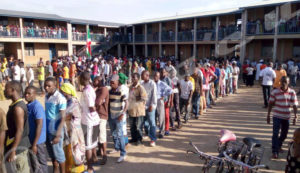
Long queues at Kamenge Basic School where voting took place in a good atmosphere.
The streets were swarming with people very early in the morning in the urban area of Kamenge (north of the capital Bujumbura). At 5:45 a.m., the traffic was similar to that observed during rush hour in Bujumbura city center. In spite of the morning freshness, voters were already in long queues.
At Kamenge Basic School, voting began at 6a.m. There were 3 voting centers on the spot: Teza, Twinyoni and Songa. The Teza voting center had 7 polling stations where 3250 people were expected to vote. That of Twinyoni had 6 polling stations where 3500 voters were expected to cast a vote and Songa had 9 polling stations for 4700 voters. Before each polling station, long queues were observed.
Security was highly ensured
On the security side, several police officers could be seen inside and outside the Fundamental school. They stayed away from voters but closely monitored the voting process. On the main road, the atmosphere was good. People were in small groups, laughing, proof that the vote took place in tranquility.
The only downside, as Augustin Hakizimana, one of the presidents of the polling station in Teza voting center said, was that some voters wanted to vote on the spot while they registered in the country: “We asked them to ‘wait for the instructions given the National Independent Electoral Commission-CENI.
Christian Bigirimana
Gihosha area : Large crowd in polling stations
At the voting center of Gasenyi II Fundamental School, Taba district in Gihosha area, in the urban commune of Ntahangwa, voters showed up before 6 a.m. The center had 8 polling stations. All voting materials were in place.
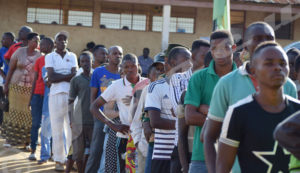
Long queues of voters in front of polling stations at Gasenyi II Fundamental School.
Voting began at 6:20 a.m. with a massive influx of electors. Long queues were observed. On the population’s faces, one could read the thirst for voting .Around 8 o’clock, 1016 had already voted of 40033 expected voters.
Only CNDD-FDD party and Amizero y’Abarundi opposition coalition sent political supervisors. The ruling party had at least two in each polling station while the coalition had at least one in each polling station. As for the observers, there were those of Codip and Eglise Libre Méthodiste.
At Gasenyi Communal High School, the situation looked the same. The same craze among voters was observed. The vote was peaceful. At 9a.m, out of 4059 expected voters, 1167 had already voted.
At Gasenyi I Fundamental School, voting began at 6 a.m. Queues of voters were also observed there. The population was up earlier that day. Some voters said they voted too early to later on go about their activities as usual. According to the supervisors and observers on the spot, no incidents were reported. At 9:49a.m., 704 people had already voted on a total of 2002 voters.
As for the voting center located at Gihosha Fundamental School, 3570 people had already voted out of 5235 expected voters. It was around 12 o’clock.
Arrests followed by imprisonment
Emelyne Ndayishimiye, a 15-year-old student at Gasenyi I Fundamental School, was arrested and taken by police officers to Gihosha zone office. It was around 9 o’clock. According to witnesses, the girl would have been accused of having pronounced the phrase “vote No” when she was walking about 300 meters from the polling place. According to the same sources, a young Imbonerakure who heard it quickly alerted the police which later on arrested her.
The judicial police officer (OPJ) who interrogated her later on put her in jail. The Information was confirmed by her mother and Taba district chief, Masud Ndizeye.
Her mother, Micheline Ndayishimiye, did not hide her pain. In tears, she said. “When I came from the morning mass at St. Jean Baptiste Parish in Gihosha, I heard that my daughter had just been arrested. She jokingly uttered those words. She was misunderstood. Mrs. Ndayishimiye asks for the release of her daughter.
The arrested girl lives in Taba neighborhood, some 300 meters from the voting center located at Gasenyi II.
Félix Haburiyakira
Ngozi: A very early vote
Since very early in the morning, there were long queues at the different polling stations. Agathon Rwasa went to vote in his native area. This president of Amizero y’Abarundi coalition said the vote was riddled with irregularities.
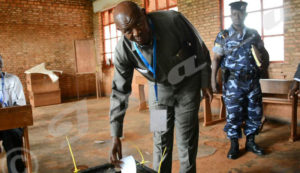
Agathon Rwasa voting.
At Ngozi I Basic School, dozens of voters were in front of polling stations at 5:40 a.m. A motorcycle taxi driver called me, “Mr. Reporter, there are more of them at Ngozi II Fundamental School.” I went there. At 5:50 a.m., more than 400 people, mostly rural women, were in queues before the polling stations. Everyone was calm but eager to vote. “Igikorwa n’ica kare / A job must be done early,” said a lady with a smile. The president of the voting center had already taken an oath. Polling station members were checking all the material.
At 6:02 a.m., the first polling station opened. The head of the polling station showed the voters that the ballot box was empty before sealing it. Other presidents of the polling stations did the same a few minutes later. Afterwards the vote began. I took the road to Kiremba commune of Ngozi province, specifically to Ciri, the birthplace of Agathon Rwasa. There were no queues before 8a.m. “This polling center did not register many people the reason why there are not many people. The bulk of the voters have already cast a vote, “said one member of the three polling stations.
A mass of women were sitting in the yard but had already voted. Young men and children moved around. “Mutama araje” (“Rwasa comes”), whispered the voters every time they heard the sound of a vehicle.
Agathon Rwasa speaks of irregularities
At 10:06 a.m., Agathon Rwasa arrived. All those who were scattered gathered. Joy could be read on their faces. The first vice-president of the National Assembly was with his wife who went to another polling station. Mr. Rwasa raised his hand when greeting people. The crowd cheered. After the vote, he checked to see if his supervisors had come and the answer was positive. He said he came to vote to show “his critics that he had participated in the election before he talked about the irregularities that characterized the event.”I deplore a lot of irregularities, intimidation of all kinds, people forcing others to vote against their will. ”
As to whether or not he will accept the results if the “Yes vote” wins, Agathon Rwasa said: “Let’s wait for the results. Otherwise it would be speculation.”
After the interview with the journalists, he went to another polling station and asked the person in charge of the polling station if he put the stamp on the registration paper and the latter answered no. Mr. Rwasa found it obscure because, according to him, it is difficult to know if this or the other one has voted.
As he walked towards his vehicle, some people eventually gave him handshakes despite the refusal of his protocol officer. Among the crowd, there was a well dressed old lady. “It was his mother. Give her a way, “said a lady. She got into one of the vehicles of the convoy. The crowd followed the procession of the native of Ciri and the courtyard of the voting center got empty with people little by little.
Onesphore Nibigira
“A great day for the majority of Burundians”
The President of Burundi and his spouse showed up very early in the morning at the polling station of Buye Basic School in Mwumba commune of Ngozi province. For the Head of state, this is a big day expected by the majority of Burundians.
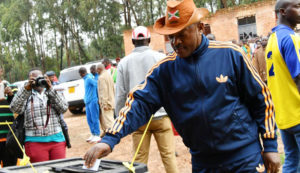
Very early in the morning, the President of the Republic had finished voting.
At 6:30 a.m, the presidential couple was already at Buye Fundamental School for the constitutional referendum, in the native village of President Pierre Nkurunziza, in Mwumba commune of Ngozi province. “This is a big day expected by the majority of Burundians. It is also a patriotic gesture which proves that all the Burundian people must contribute to the building of their country, “said the Burundian president just after voting.
On this school, there were 4 rows of voters. The trend was the same until 9 o’clock. The military, police and journalists were given priority and their registration centers were not considered. It was authorized by the National Independent Electoral Commission-CENI
Until 9:15 a.m., 173 out of 473 voters had already voted at the first polling station. The second had received 199 among 462 voters. The third polling station had 194 out of 468 expected voters. At the last polling station, 225 out of 445 expected voters had already cast a vote.
Some voters said they were satisfied that the vote was conducted peacefully. “We hope we made the right choice to make a difference in this country,” said a voter from Buye.
Dorine Niyungeko
Rumonge: Amizero y’Abarundi coalition denounces electoral fraud
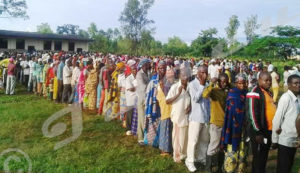
Queues of voters on Gashasha hill, Kigwena area, Rumonge commune.
The opposition coalition Amizero Y’Abarundi denounced the fraud and irregularities that were observed during the referendum vote, especially in Rumonge commune in Kizuka and Minago areas. The coalition’s supervisors were prevented from doing their job.
An MP elected in this provincial constituency from this coalition denounced the influence of some presidents of polling stations and the arbitrary arrest of their activist in Muhuta commune called Pascal Ndikumazambo.
He denounced the presence of the Imbonerakure -youth affiliated to the ruling party near the polls to intimidate those who came to vote.
Contacted, Jean Buregeya, Vice President of The provincial electoral commission in Rumonge province, said clear instructions were given to the presidents of polling stations to allow all supervisors of political parties and coalitions with letters of accreditation to supervise the vote.
The participation rate in Rumonge province exceeded 95%.
Félix Nzorubonanya
Gitega: Priority to the referendum
Of all the polling stations visited, whether in Giheta or Gitega commune, half of the registered voters had already voted at noon. The long queues that were observed at the beginning of the election had disappeared.
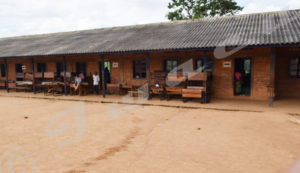
On the polling station at the Fundamental School of Gataba in Giheta commune, at noon on Thursday.
Since the morning, life in Gitega seemed stopped. The market and administrative offices were closed including the transport sector. Everyone had one and only concern: the election. Voters got up early, which resulted in long queues in the morning. At the polling stations, no incidents were noticed.
Everything was ready by 6 a.m. in the morning. Political supervisors or those sent by the associations could be seen at many of the polling stations. The majority of them were of the ruling CNDD-FDD party.
“It’s not like the previous elections, there was no jostling in the queues,” said Gaspard met on the polling station at Ecole Fondamentale de la Paix in Magarama. Even the members of the communal electoral commission did not have a heavy task.
“They came with documents in order. However, some people were mistaken about the polling station because they did not read on the voting card in which polling station they would vote, “said the president of the polling station in Yoba.
“We have not seen any irregularities so far,” said a supervisor from Amizero y ‘Abarundi coalition at the Gataba polling station in Giheta.
Other activities in slow motion
The shops, the cabarets were closed. Traders who had rushed to the polls to continue their usual activities afterwards were disappointed.
“The market was closed. Those who guard it told me that they have been ordered not to let anyone in,” said a shoe salesman at Gitega central market.
This prohibition to do other activities was not only in the town of Gitega. Even in Giheta commune, the motto seemed the same. For travelers who used to go down to Bujumbura with banana or charcoal bought on the Bujumbura-Gitega route, the place was deserted.
“They went to vote, maybe they’ll come back in the afternoon,” a woman told a van driver who wanted to take a bag of charcoal from Giheta.
Throughout the day, everything was calm in Gitega, the population mainly urban ones formed small groups waiting for the announcement of the votes.
Jean-Noël Manirakiza
Inhabitants of the south of the capital responded massively to the vote
From Kanyosha to Kinindo zone via Musaga, unlike the 2015 elections, the whole Muha commune had mobilized for the vote.
At 7:30 a.m., on the Ruyaga hill, in Kanyosha zone, at the voting center located at St Emmanuel church, the vote was in full swing.
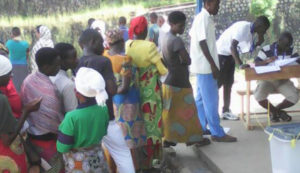
Voters at Nyamutenderi fundamental school
Of the 590 expected voters in the 2 polling stations, 273 have already voted. The situation was the same at Nyamutenderi Fundamental School where observers from CACEDEBU and ADC were seen. Of the 1859 registered voters, 530 had already voted. It was the same with the residents of Kamesa I neighborhood and the surrounding households.
In the center of Wallis, near the bus station on the RN1, there were long queues at the entrance. In polling station # 1 alone, out of 550 registered voters, half of them had already voted. The peculiarity was that there were supervisors and observers from all the civil society organizations that decided to take part in this referendum such as La Fontaine Isoko, CODIP, the ministry of the interior, etc. All the supervisors from all political parties could also be seen.
In Kinanira
Usually reluctant to vote, the people of Musaga neighborhood participated in this referendum. Around 11a.m, Kinanira Fundamental School was crowded. Among the electorate, there was the youth aged 18. “Unlike the 2010 and 2015 elections, this is proof that the public was waiting for this referendum,” said Charles Bitoke, a member of CNDD-FDD.
For him, no matter the outcome of the vote. The bottom line is that citizens will have peacefully fulfilled their civic duty. However, among the voters, there were those who voted only because of fear. “I’m just going to vote so that during a search, I do not get labeled as a recalcitrant person,” says a woman in her forties. Supervisors from all political parties were also present.
The situation was different at Kinindo fundamental school. The only supervisors present were those from the ruling party. Calm and serenity reigned supreme. At around 12 o’clock, out of 4136 voters registered in 8 polling stations, 2152 voters had already cast a vote. Another thing noted was the ignorance of people about the voting procedure, what caused some ballots to be null. Note that with the influx of voters, all presidents of polling stations in the south of the capital agreed that voters would have finished voting by 3p.m if nothing changed.
Hervé Mugisha
Ntahangwa Commune
In Ngagara 7 quarter, voting began at 6:30 a.m. in the premises of Saint Gabriel High School. This center consisted of 6 polling stations. 3,361 voters were expected to cast a vote. The military and the police voted first.
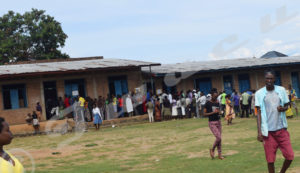
Voters queuing in front of polling stations in the center of Kibanguiste Church.
They were numerous and had heavy weapons. Some students under the age of 18 showed up with their registration papers. However, they did not vote. They had registration papers in the perspective of the elections of 2020. Voters lined up in front of polling stations. They were numerous. No incidents were reported.
At the fundamental school in Quartier 4 in Ngagara, the vote began at 6:45 a.m. This center consisted of 5 polling stations. 2536 voters were expected. At 10:45 a.m., 1273 had already voted. Voters were not as numerous as in Quartier 7. In Ngagara Quartier 5, the vote began at 6:40. Voters came in twos and threes.
The voting center had 5 polling stations. The expected number of voters was 2640. Up to 11a.m, 1270 had already cast a vote. Voters were peaceful. Two voters who registered in Ngozi were denied to vote. They registered in that province while they were doing their internship. They did not get their cards and therefore could not have any proof of their internship in Ngozi and were therefore not allowed to vote. They presented only registration papers. They were frustrated. Unlike in Quartier 7, there was no an impressive police presence.
In Mutakura neighborhood, a good portion of voters voted at Kibanguiste Church. The voting center consisted of 10 polling stations. 5408 voters were expected. At 10:40 a.m., more than 2000 had already voted. The military and police were numerous. 14 supervisors of the ruling party, 5 from UPRONA and one from Amizero y’Abarundi Coalition were present. 4 observers from La Fontaine-Isoko Association were also on site. The vote was peaceful.
At the 14th avenue in Cibitoke area, north of the capital, the electors went to Don de Dieu High School. Seven polling stations were planned. They had opened doors since 6:30 a.m. The expected number of voters was 3363.
At 10:50 a.m., 2249 people had already voted. Many military and police officers ensured security. 14 supervisors of the ruling party CNDD-FDD, 2 of Amizero y’Abarundi coalition and 5 of UPRONA party were there. There were no queues.
Each polling station had permission to add 50 voters to the expected number of those who registered. They constituted an additional list and included the soldiers, the police, supervisors and journalists. In addition, they could authorize the proxy vote to 20 people.
Parfait Gahama
Mukaza Commune
In the voting centers of Bwiza, Nyakabiga and Buyenzi zones, polling stations were open at 6a.m. Voters were in queues. Illiterate people had difficulty finding polling stations where they had to vote.
They made it after they were helped by other voters.
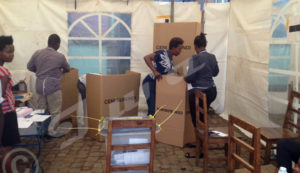
At 10a.m., the agents of CENI set up booths at the voting center located at the third avenue in Bwiza zone.
A good number of supervisors were from CNDD-FDD party. For example, at Buyenzi Basic School that consisted of 9 polling stations, out of 24 supervisors, 14 were from the ruling party, 6 from Amizero y’Abarundi coalition and 2 from Sahwanya FRODEBU Nyakuri party. Another two did not want to reveal the political formations they represented. The same case occurred at the voting center located in Buyenzi communal high school with 8 polling stations. Out of 25 representatives present, 17 were from the ruling party, four from Amizero y’Abarundi coalition, three from Sahwanya Frodebu Nyakuri and one from UPRONA.
Some presidents of polling stations did not give information to the journalists. They could not reveal the number of registered voters and those who had already voted. The Independent Communal Electoral Commission (CECI) had prohibited them from providing such information to journalists.
At the voting center of the 9th avenue in Bwiza zone, the polling booths were not sufficient. This center had 5 polling stations and each one had only one polling booth. Normally, each polling station must have two booths. As a result, voters spent a lot of time waiting on queues. Some complained. Others went back to return in the afternoon. Around 10 a.m., the polling stations were cleared. The agents of the national electoral commission-CENI brought other booths.
At the University of Burundi, on Mutanga campus in Mukaza commune, four polling stations were open at 6a.m. A number of students were not allowed to vote because their names were not found on the lists. The agents of the polling station asked them to check at the other polling stations.
At “Tribunal de Residence” in Bwiza zone, the vote began at 6 a.m. There were 6 polling stations. At 10:45a.m, 1544 voters had already voted out of 2966 expected voters. Supervisors from CNDD-FDD and those from Amizero y’Abarundi coalition were on the scene.
In the same neighborhood, just a few meters away, at Université Paix et Reconciliation, the voting activity began at 6 a.m. Around 11a.m, people came in small numbers. There were 4 polling stations. In some polling stations, agents were waiting for voters. At that time, 834 voters had already voted out of the expected 1389. Supervisors from the coalition Amizero y’Abarundi, CNDD-FDD and UPRONA parties oversaw the polling process.
Pierre Claver Banyankiye
Muramvya: Some cases of arrest
In this province in the center of the country, the election went generally well, but with some irregularities.
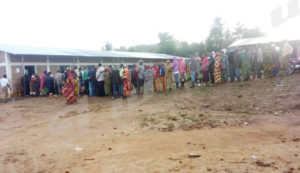
Voters queuing at the Muramvya II voting center.
At 5:55a.m., the sun had already set. In front of Muramvya Basic School (Ecofo) II, a few meters from the paved Muramvya-Gitega road, long queues were observed. People responded massively to the poll. Agents of the national electoral commission were busy. They emptied the ballot boxes to show that there was nothing. They installed the booths … However; they had not yet received the form to take an oath. At 6:5 a.m, the president of the voting center gave the instructions. They had to start without taking an oath. “It’s all about consent. They know the task entrusted to them, “she said.
At the voting center in Muramvya III, the same situation was observed. They opted for reciting a text that they composed themselves. At the same center, two people tore up their ballots. One of them, a young man, was arrested by the police. “The other was an old woman. She might have done so out of ignorance, “said the president of the center.
At Muramvya I Voting Center and Muramvya High School, activities began at 7:00a.m. The delay was due to the lack of some materials such as the stamp.
Small numbers of supervisors from the opposition
Only CNDD-FDD party managed to send supervisors to all polling centers. Amizero y’Abarundi coalition only had them in some centers. Just like UPRONA. Of the 8 polling centers visited, only two had civil society observers from Codip and Acopa.
In some voting centers in Muramvya commune, there were no pens in the voting booths. Agents at the polling station told us that they did not put these pens in polling booths because of the lack of rope to tie them.
In the centers of Muramvya commune where we passed around noon, more than 60% of voters had already cast a vote.
At the voting center that was located at Murambi Communal High School, out of 829 expected voters, 577 had already voted (69.6%). At Muramvya II voting center, out of 2116 people expected, 1345 or (63.5%) had already cast a vote. In the center of Murambi Fundamental School, out of the 777 people expected, 473 had already voted.
Four people got arrested
The police arrested four people. They were accused of disrupting the referendum. Patrick, in his thirties, was arrested on Thursday morning at Muramvya High School voting center. After voting, the young man tore the ballot in two pieces and before depositing it in the polls, the polling agents called the police who immediately arrested him.
Another old woman committed the same crime but was not arrested. “Maybe she did it out of ignorance,” said the president of the polling center.
Another woman was arrested at Muramvya High School voting center, she was also charged with tearing up her ballot.
At Mwegera voting center in Mbuye commune, another person was arrested. He was accused of preaching “No” to people in queues waiting to vote.
Another person was arrested early in the morning (1a.m) at Kiganda voting center. While he was hired as a voting agent at this center (Kiganda), the police intercepted him around 1a.m inside the room.
The president of the polling center replaced him with another agent in the morning.
Sources say that all those who have been arrested belong to Amizero y’Abarundi opposition coalition.
The provincial police commissioner, Isidore Ryakiye, confirmed the arrests but did not specify their political affiliations.
Bella Lucia Nininahazwe
Bubanza :The population went to vote on time
At 6a.m, long lines of voters were already observed in front of polling stations in different communes of Bubanza province. At the voting centers in Bubanza, Mpanda and Musigati communes, the vote began on time.
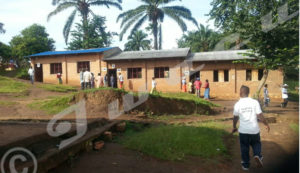
Voters on queues in Musigati.
Irregularities were noted particularly in Musigati commune. At the voting center located at Lycée Musigati, an elector who submitted a registration paper could not vote. CENI agents explained that it did not have a registration number. The elector had to wait for authorization from CENI. Another irregularity is that trainees at Mpanda Hospital were prohibited from voting in Mpanda because they did not register at this polling center. After exhibiting evidence that they actually came to Mpanda for work reasons, they were allowed to vote.
By midday, half of the expected voters had already cast a vote.
While there were long lines at different polling centers between 6 a.m. and 7 a.m., the situation changed afterwards. At 8 a.m., people came in twos and threes. At Bubanza II voting centers, Gisovu High School voting center and at Musigati Parish Voting Center, there were no longer long queues. More than half of the expected voters had already voted according to figures provided by CENI agents.
In most polling centers, the political supervisors were mainly made up of the CNDD-FDD party members and those of Amizero y’Abarundi Coalition. Observers from civil society organizations like Fontaine Isoko and Codip could also be seen.
Christine Kamikazi
Cibitoke province population voted in serenity
The province of Cibitoke had 286,888 people registered to vote and 14,800 were women. There were 200 voting centers with 718 polling stations. The vote started on time in almost all polling stations except at the voting center located at Cibitoke fundamental school in Rugombo commune. Four members of a polling station at this center were absent. However, they were quickly replaced.
Rugombo commune alone had 6827 people who registered to cast a vote. 5804 of them got their voting cards. The political supervisors present were those of CNDD-FDD, those of Amizero y’Abarundi opposition coalition and those from UPRONA party. Observers from two civil society organizations (Codip and Onelop), were also present.
The Second Vice President of the Republic, Joseph Butore and his wife, voted in Bukinanyana commune at the voting center that was located at Masango Basic School.
Arnaud Igor Giriteka
CNDD-FDD: All is well that ends well
On the last day of its referendum campaign on Monday, May 14, the ruling party was in the city of Bujumbura.It said it was the only party that was responsible for the implementation of the Arusha Agreement.
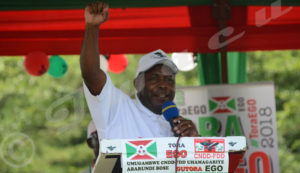
“May no one tell you that CNDD-FDD does not adhere to the Arusha Agreement”
Cercle hippique was the place chosen by the Bagumyabanga (members of the ruling party) to host the final referendum campaign. Everything was done to make the closing of the campaign a success. Folk dance group, drummers and “Komeza Gusenga” choir were mobilized for the end of the campaign. The national radio and television was not left behind. It had deployed all the necessary equipment to cover this event in real time. Under the prophetic musical tunes of Komeza Gusenga choir, the senior executives arrived one by one. The atmosphere was good.
As at the opening of the campaign in Bugendana, representatives of the diplomatic corps were present. Delegations from Russia, South Africa, Kenya, Gabon, Egypt, Mali and Ivory Coast could be seen. Activists from all over the country wore flags with the colors of the ruling party. True to one of its slogans placing the Almighty above all, it was through prayer that the ceremonies began. The various religious denominations succeeded one another on the platform imploring the Almighty to bless the festivities.
This was followed by the demonstration of Bagumyabanga dance groups from different provinces. The effervescence reached its climax when the tube “wakoroni” was played. All the dignitaries got up and began to dance. The originality of this piece of music in Swahili language lies in the lyrics. Indeed, the author of this song refers to the colonizers as the source of all evil. “Wambie wa koloni saa imeeneya” (“Go tell the colonizers that their time is over”) says one of the verse of this song. All Bagumyabanga (members of CNDD FDD party) sang the chorus. It is after the song that Evariste Ndayishimiye, secretary general of the party came to the podium where he delivered an energetic and to some point aggressive speech against those whom he called the “colonizers” and their acolytes of the “PDC” compared to the militants of the NO campaign.
As a reminder, the Christian Democratic Party was opposed to the immediate independence of Burundi. These people were subjected to condemnation throughout his speech.
CNDD-FDD sensitive to the Arusha agreement
“It is high time Burundians took control of their destiny and enjoy all their effective independence,” Ndayishimiye said. He added that the moment was more than favorable to come through. He said the period of authoritarian regimes is over and that it is time to embrace a brighter tomorrow. Referring to the Arusha Peace Accord, the Secretary General of CNDD-FDD praised his party. He claimed that his party instigated the implementation of the Arusha Agreement. “Other politicians were only concerned about sharing political posts. It was not until we arrived in 2005 that Burundians were able to benefit from the dividends of this agreement,” he said.
In support of his remarks, he cited the recasting of the national defense forces, the establishment of the Land and Other Property Commission and the Truth and Reconciliation Commission. According to him, all this were only achieved thanks to the unwavering commitment of CNDD-FDD to build a prosperous nation. “May no one tell you that our party does not adhere to the Arusha Agreement,” said the ruling party’s secretary general.
He was not at all tender towards the supporters of the “Oya” in the referendum. He thought they were in the pay of the colonizer and therefore took them as traitors. “Those who are preaching to vote no in the referendum want us to live through tragic experiences again,” he warned.
Despite his absence, the President of the Republic was not forgotten. Mr. Ndayishimiye praised him for his exemplary leadership. He said, “Everywhere in the world, it is the government that organizes referendum campaigns, but in the case of our country, our president has allowed political parties to take part in its organization.”
The former Minister of the Interior ended his plea by asking the Bagumyabanga to implore the Holy Spirit to guide the lost souls and for the YES to wins with an overwhelming victory at 100%.
Arnaud Igor Giriteka
Closing of the “No” campaign
Started by a long march of over 5 km, members of Amizero y’Abarundi coalition were reassuring for the victory of the “no”. They crossed the neighborhoods singing songs praising their leader in front of an astonished population.
They were thousands in Gitega this Monday, May 14th. Coming from several corners, they converged on the meeting place, not far from Gitega Court of Appeal.
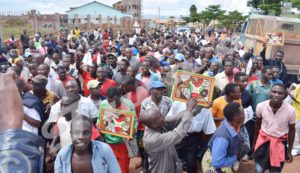
Amizero y’Abarundi coalition’s supporters marching towards Zege, the meeting place.
This place is known by the Bagumyabanga, members of the ruling party, as a place of remembrance where they had dedicated their party and the country to God. With white T-shirts on which was drawn a specimen of the ballot for the referendum of May 17, cap on the head, they shouted to whoever wanted to hear it that the victory was near and that it would be decisive. As one man, even the women, deemed weak to walk long kilometers, kept up the pace to the hill of Zege on the heights of the town of Gitega. The singing and dancing atmosphere continued until the arrival of Agathon Rwasa, their leader.
Accompanied by Léonce Ngendakumana of FRODEBU and Evariste Ngayimpenda of UPRONA not recognized by the government, Agathon Rwasa turned up at 2:30p.m. In his speech, he strongly criticized the ruling party.
“They have long hidden this draft revision of the Constitution and didn’t include some members of the government. I saw it for the first time at the end of April. What was their intention by keeping it secret while they declare everywhere that it is the Burundian people who asked for? ”
Burundians called on to vote “no”
Having enumerated several reasons for rejecting the revision of the current Constitution, Agathon Rwasa has distinguished himself as a defender of the Arusha Agreement which, according to him, allowed the Burundians to live in peace after several years of civil war.
“These people who are leading us today would never have left the refugee camps hadn’t there been this deal they seek to do away with at all cost. We refuse to condone these shenanigans of an individual or a small group of people who want to hold on to power by discriminating other Burundians.
While continuing to preach against the project of the revision of the Constitution “wanted by some individuals”, he asked the people of Burundi, who love peace and justice, to express their views by voting “no”. ”
“Go and tell these people that voting No will free them from this dictatorship imposed by a single individual. Vote No to show this group that we want to live in peace. By choosing no, you will allow these people to be free because history has already shown us that totalitarian and dictatorial regimes have no friends. ”
At the end of the evening, the day ended as it had started, the dances and the songs closed the activities of this referendum campaign.
Jean Noël Manirakiza
“Be vigilant on polling day!”
A few days before the end of the referendum campaign, Amizero y’Abarundi coalition ran campaign on Friday, May 11, in Kabezi commune of Bujumbura province and in Bujumbura city as well. Agathon Rwasa urged his supporters to be vigilant so that the elections should not be rigged.
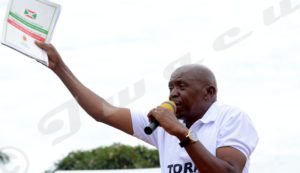
Agathon Rwasa: “Be vigilant on the polling day!”
In Kabezi area, the militants of Amizero y’Abarundi began to come timidly. The preparations for the meeting were going well. Songs praising the coalition, especially Agathon Rwasa, could be heard from the speakers that were installed on a van. The young, old and even schoolchildren turned up in twos and threes. Some approached the stage and others stayed away. Militants in charge of security began to position themselves on each side.
At 10:45 a.m., supporters of Amizero y’Abarundi coalition began to gather. A rally was organized. It started from the buildings of Kabezi Prosecutor’s Office and was held up to Bujumbura-Rumonge road (RN3). The van with the speakers opened the way and activists followed. “Tora Oya, Tora Oya, Abarundi Tora Oya! “(Vote no, all the Burundians, vote no!), they chanted while marching. An old woman of about sixty years ran painfully. She tried to follow the movement. “Tora Oya turwanye agacinyizo”, (“Vote no to fight against oppression”), she said to onlookers assembled all along the road. They burst out laughing. She tirelessly continued her way.
When they arrived on the paved road, the voices redoubled intensity. They had just seen a large group of ruling party activists preparing to leave for a rally in another locality.
At 11:30 a.m., a long line of cars arrived from Bujumbura. Cries rose in the crowd. Agathon Rwasa, president of Amizero y’Abarundi coalition, arrived with his delegation. Militants encircled the car of their leader. “Rwasa president! Rwasa president! It was like being in a presidential campaign. Singing songs that mainly glorified Rwasa, they made the same journey towards the meeting place.
“This project is worthless!”
While speaking, Agathon Rwasa asked activists a question: “It is said that this draft Constitution emanated from you. Is this true or it’s a lie? “Militants answered that it’s a lie.”Therefore, we must vote ” NO ” because this draft Constitution has a zero value.
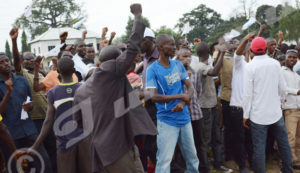
The Coalition’s activists in the capital said they were determined to vote no.
Agathon returned to the attempt to revise the Constitution in 2014: “The goal of this attempt is to seek one more term in office. It’s the same today. “He asked his activists to be vigilant because, according to him, the results might be rigged. “Do not leave polling stations before the counting of votes is over.”
The president of Amizero y’Abarundi Coalition listed several reasons that drived his formation to campaign against the referendum. Agathon Rwasa said the President of the Republic should first consult the office of the National Assembly and the Senate before calling Burundians to express themselves on this draft Constitution referendum. According to him, it is a violation of the law. “I can assure you that since I have been in this office, we have never sat down with the President of the Republic to discuss issues that Burundians are faced with.” Moreover, he adds, some articles of this project come to divide Burundians as at the time of apartheid in South Africa. After Agathon Rwasa, it was the former First Vice President of the Republic, Yves Sahinguvu, who took the floor. He demonstrated the importance of the Arusha Agreement. For him, what is urgent the creation of a favorable climate for Burundians in exile to return.
Activists worried about their safety
Some of the activists were afraid of what would follow the meeting. “Coming here to Kabezi was not easy,” said an activist from Mutambu commune.
According to many of them, the Imbonerakure (young members of the ruling party) started intercepting them since morning. “We made the decision not to come in groups to thwart their plans.” A woman in her fifties, from Nyabiraba commune, wondered if they would not be attacked during the night. Others tried to reassure her. Most of them were more than determined. “Nobody can stop us. We have Agathon Rwasa in our hearts. ”
At 1 p.m., the delegation of Amizero y’Abarundi took the road to Bujumbura city singing songs of Amizero y’Abarundi.
Throughout the road, onlookers composed of adults and children shouted “Tora Oya!” (Vote no!). Others shouted “Tora Ego! (Vote yes!)
Activists in the capital Bujumbura determined to vote No
The meeting was planned at the ” Tempête ” field. People arrived timidly. Some were standing apart. They did not want to approach. “We’ll get closer when there are more people,” they said. Those who arrived first in group were the students from the University of Burundi. With small flags that read “Tora oya!” they provoked the crowd by touring the field singing the songs of Amizero y’Abarundi. Bike taxi drivers and other people who had stayed away from each other approached the area. Around 3.30 pm, Agathon Rwasa arrived with his delegation amid the shouts of his supporters. The other senior executives of this coalition, like Evariste Ngayimpenda, Yves Sahinguvu and Tatien Sibomana, were also present.
Rwasa delivered his speech, almost the same as the one he gave in Kabezi, in front of an audience ready to defend their rights, “despite threats.” They said they were determined to vote “No”. “Today, all freedoms are flouted, we will vote ” no ” to change all that,” said one of the activists. “In addition, we do not see the importance of revising the 2005 Constitution,” added another. After the meeting, activists from Amizero y’Abarundi toured some avenues in the city of Bujumbura, chanting “Tora Oya! Abarundi Tora Oya! “Vote No, Burundians Vote No ”
Fabrice Manirakiza
End of campaign referendum Assessment: Shared opinions
The referendum was held Thursday, May 17 in a context of absence of international mission of observation and a heated referendum campaign.
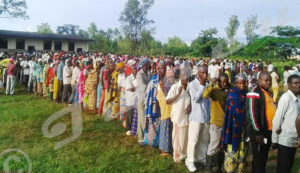
The population voted overwhelmingly in the constitutional referendum.
The ruling CNDD-FDD party, UPRONA party and other pro-government parties are rather satisfied with the election campaign. They appreciate the good cooperation of the administration and the police.
As for the coalition Amizero y’Abarundi, it blows the whistle. In a press release, the coalition’s parliamentary group counts a person killed in Kirundo province and 59 coalition activists arrested in 10 provinces of the country during the referendum campaign period. This parliamentary group specifies that 18 militants are in a critical situation among the 70 activists who were seriously beaten or stoned. It also reports acts and messages of intimidation against those who participated in the campaign that was organized by Amizero y’Abarundi coalition. This parliamentary group also deplores the fact that a certain Révérend Nimenya illegally held a press conference and meetings in the name of Amizero y’Abarundi, without being recognized in this coalition and called Burundians to vote “yes” in the constitutional referendum.
Absence of international observers
The National Independent Electoral Commission said no foreign observation mission had requested accreditation for the current referendum. The communication and public affairs officer at the East African Community said that due to unexpected circumstances, the EAC will not send an observation mission to Burundi. Richard Owora, however, said “the EAC wishes to the government and Burundi a peaceful referendum.”
Agnès Ndirubusa
Reactions
The African Union Commission: “The referendum will further aggravate the crisis”
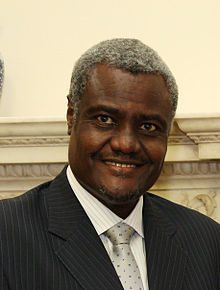 Moussa Faki, the chairman of this commission, sent a letter to the chairman of the EAC, who is at the same time the mediator in the Burundian peace talks. The Commission deplores the fact that the dialogue is not progressing and indicates that the referendum will further aggravate the crisis in which Burundi is plunged and seriously jeopardizes the peaceful way of resolving the crisis.
Moussa Faki, the chairman of this commission, sent a letter to the chairman of the EAC, who is at the same time the mediator in the Burundian peace talks. The Commission deplores the fact that the dialogue is not progressing and indicates that the referendum will further aggravate the crisis in which Burundi is plunged and seriously jeopardizes the peaceful way of resolving the crisis.
According to Moussa Faki, negative consequences of the revision of the Constitution will affect Burundi as well as the sub-region. Musa Faki asked Ugandan President Yoweri Museveni to act, to deal with the situation as guarantor of the Arusha Agreement.
Switzerland concerned
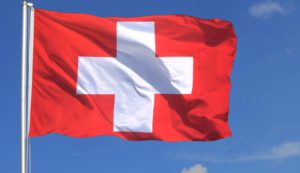 This European country indicates that the constitutional referendum takes place in a climate of intimidation and political tension. It recognizes the sovereignty of Burundi and remains committed to the Burundian population. Switzerland notes that the mediation conducted by the EAC is to a standstill. It calls on all parties to resume the dialogue and Bujumbura government to respect the spirit and the letter of the Arusha Peace Agreement. This country deplores signs of a growing weakening of fundamental freedoms in Burundi. These include the recent suspension of VOA and BBC radio stations, the monitoring of journalists, arbitrary arrests and the ongoing toughening of the Code of Criminal Procedure.
This European country indicates that the constitutional referendum takes place in a climate of intimidation and political tension. It recognizes the sovereignty of Burundi and remains committed to the Burundian population. Switzerland notes that the mediation conducted by the EAC is to a standstill. It calls on all parties to resume the dialogue and Bujumbura government to respect the spirit and the letter of the Arusha Peace Agreement. This country deplores signs of a growing weakening of fundamental freedoms in Burundi. These include the recent suspension of VOA and BBC radio stations, the monitoring of journalists, arbitrary arrests and the ongoing toughening of the Code of Criminal Procedure.
Analysis by Agnès Ndirubusa
A well-oiled machine for what result?
The referendum takes place despite opposition protests. The opposition platform in exile and the civil society have repeatedly protested against the inaction of the international community and called for strong sanctions against Bujumbura government to force it to abandon its plans to revise the constitution.
The government that seems to scoff at everyone in the name of “sovereignty” has stood to its guns especially since there has not really been any major pressure from the international community in general or from the East African community apart from some statements about the “concerns” of Westerners … In short, there was nothing that could have stopped Bujumbura from moving forward. In the sub-region, the mediation / facilitation in the inter-Burundian dialogue remains deadlocked.
At the moment, the results of the referendum which took place on May 17 are not yet known. To avoid any speculation, what we already know is the massive participation of voters. The call to boycott the referendum by the political class and civil society in exile has not been followed. It remains to know the choice of Burundians, if f they voted “ego=Yes” or “Oya=NO”.
Translated by Pierre Emmanuel Ngendakumana

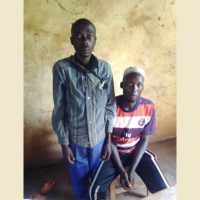
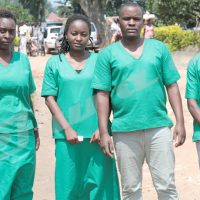
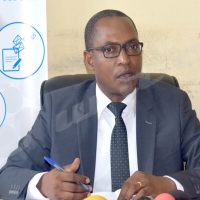

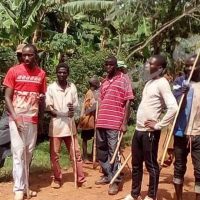













 IWACU Open Data
IWACU Open Data

